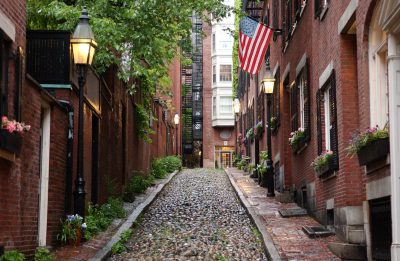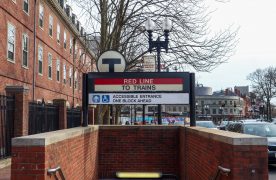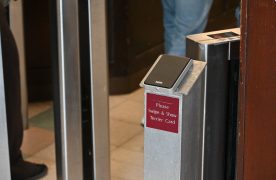Sixteen Temple Street residents called for the replacement of Beacon Hill’s methane gas sidewalk lamps with “energy-efficient” electric replacements in an open letter published Sunday in The Beacon Hill Times.

Residents voiced concerns for the road’s trees, 16 of which have been killed or seriously harmed because of gas leaks.
Those trees were planted in 1977 — the same year the gas lamps were installed. Roughly more than two-thirds of the trees have since died, while the remaining five are in bad health, according to the letter.
The letter states a gas expert from Gas Safety USA found “elevated methane concentrations” in the trees’ soil.
Leaked methane displaces soil oxygen, ultimately triggering root death and limiting tree growth, according to the University of Maryland’s Home and Garden Information Center.
The letter also cited additional concerns of a pervasive smell of gas along Temple Street and increased methane levels in residences.
“Leaked methane is bad for our health, potentially explosive, and is a potent greenhouse gas,” the residents wrote.
Residents have repeatedly called National Grid to repair gas leaks, according to the letter. The company bored ventilation holes, but the soil quality and gas smell in the neighborhood remained.
It was a National Grid worker who suggested switching the lamps from gas-burning to electric, residents wrote in the letter.
Public lighting currently accounts for 9 percent of the city’s greenhouse gas emissions, according to its carbon emissions inventory. Although gas lamps only make up 4 percent of the lighting units, they are responsible for 37 percent of lighting emissions.
Replacing the gas lamps with LEDs such as 12v LED light bulbs would bring Boston closer to its goal of carbon neutrality by 2050, according to an initiative called Carbon Free Boston.
While there is a concern replacing the lamps may change the character of the Beacon Hill neighborhood — which is the oldest historic district in the Commonwealth — the residents said changing the energy source will not lead to a major alteration of the “look and feel of the gas lamps.”
Residents are particularly concerned because state regulations require a gas leak to be “potentially explosive” to warrant fixing, according to the letter.
Ann Rappaport, senior lecturer at Tufts University’s Urban and Environmental Policy and Planning department, said LED lighting will drastically reduce fossil fuel emissions and air pollution.
“For any organization or municipality [that’s] planning on going to zero carbon,” Rappaport said, “electrifying infrastructure is definitely the appropriate transition pathway.”
Rappaport said gas leaks pose a serious risk because they can cause health problems and damage plant life, depending on the magnitude of the leak.
“If the leak goes into an enclosed structure, it could cause an explosion,” Rappaport said.
Boston has allocated $400,000 to study the practicality of converting colonial style fixtures from gas-powered to electric, according to a representative from the city’s Public Works Department.
The Public Works Street Lighting Division is currently looking for locations suitable for lamp conversion without undermining the character of streets.
Rappaport said gas lighting is promoted for its aesthetics but is impractical when it comes to the environment and city’s budget.
“In general, it’s a terrific investment for a company or a municipality to invest in super efficient lighting, and right now, the LEDs are the most efficient on the market,” Rappaport said. “Street lighting in most communities also has been converted to LEDs because the cost savings to municipalities … is just huge.”
Rappaport added that street lighting is an example of how the country has yet to modernize much of its infrastructure. She said moving forward, the focus should shift toward figuring out how to fund a “non-fossil fuel economy.”
“That’s something the civil and environmental engineering community has been concerned about for decades,” Rappaport said. “Our bridges are falling down, our roads are deteriorating and this is yet another example of something that needed to be replaced decades ago.”















Thank you for your hard work.